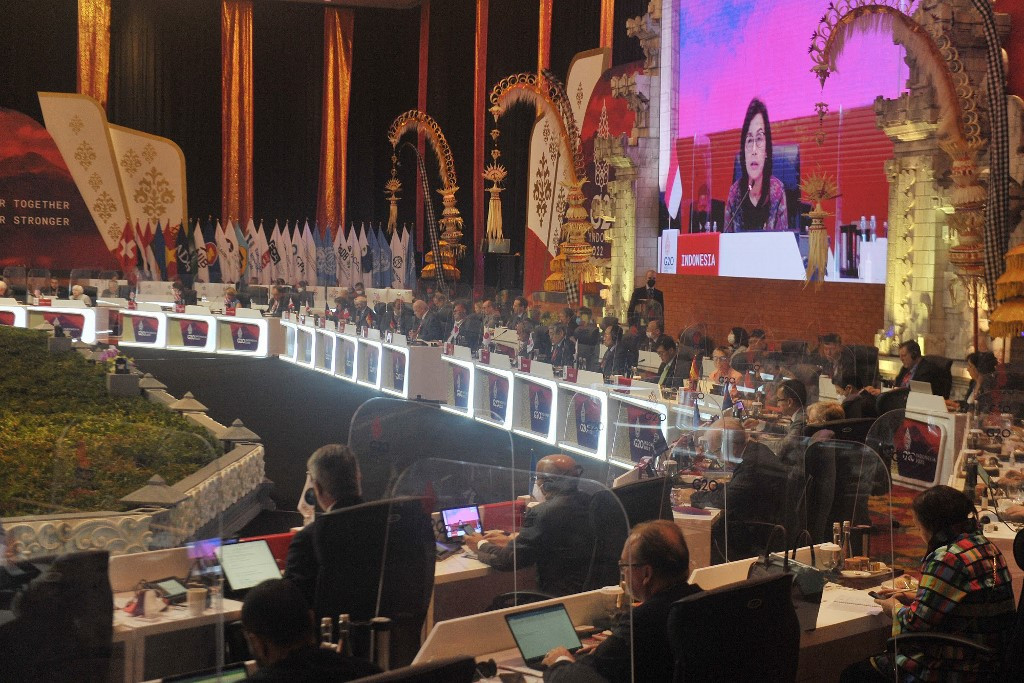Popular Reads
Top Results
Can't find what you're looking for?
View all search resultsPopular Reads
Top Results
Can't find what you're looking for?
View all search resultsG20 finance ministers and governors meeting: Hand in hand for global recovery
All G20 members must also be alert to global economic risks as interest rates normalize, and must carefully weigh the consequences for emerging and advanced economies.
Change text size
Gift Premium Articles
to Anyone
Never before has the Group of 20 been more important – and never before has it faced such challenges.
Indonesia – which holds the G20 presidency – welcomed finance ministers and central bank governors of the world’s biggest emerging and established economies to Bali last week for one of the most critical gatherings in the organization’s history.
The G20 was formed in 1999 to bring together the finance ministers and central bank governors of the world's 20 largest economies in the wake of the Asian financial crisis.
In 2008, at the height of the global financial crisis, the G20 emerged as the key international forum for global economic cooperation and was expanded to include an annual meeting of heads of state and government.
And now, at a time of immense global economic uncertainty and geopolitical instability, the G20 has never been more important as a forum to help address the shared challenges in our region and the global economy.
Many G20 economies, including Indonesia and Australia, are navigating a narrow and rocky path, with high and rising inflation, rising global interest rates, widespread skill shortages, energy and food insecurity and an uncertain and deteriorating global economic outlook.
The Australian and Indonesian economies are faring relatively well in difficult circumstances but there are substantial risks ahead.
While inflation in our two economies is below that of many others, it is expected to rise further, and the pressures felt by businesses and households are expected to get worse before they get better.
Global supply shocks have been a key contributor to domestic challenges across the world and in our region, which is one reason why global coordination is so essential.
Indonesia has received full support from members to adapt the existing G20 agenda to address the economic impact of the war, which has contributed to enormous spikes in global food and energy prices. The war in Ukraine must cease, to reduce suffering and mitigate further damage to the global economy.
All G20 members must also be alert to global economic risks as interest rates normalize, and must carefully weigh the consequences for emerging and advanced economies.
And governments should be looking to focus on the quality of spending as they repair their budgets, both to lift living standards and to ensure debt levels remain sustainable.
Australia continues to be a strong supporter of Indonesia’s G20 presidency, including for its leadership on these major economic issues at such an immensely challenging time.
The G20 agenda continues to highlight the experiences of developing countries and small island developing states, including in the Pacific. The weight of our collective challenges should not fall on the shoulders of the most vulnerable – this would only serve to exacerbate inequality and global economic instability.
It’s why Indonesia and Australia supported the establishment of the new Financial Intermediary Fund for pandemic preparedness, to bolster our region’s economic and health security.
It’s why we are both so alert to vulnerable countries facing debt distress, support greater debt transparency and welcomed progress to implement the Common Framework for Debt Treatment.
And it’s one of the reasons why we are both committed to a sustainable, inclusive recovery that’s driven by the transition to renewable energy and investment in quality infrastructure.
The Australian government’s strong commitment to ambitious climate change action has added momentum to the G20’s sustainable finance agenda. Australia’s plans to introduce globally-aligned climate risk disclosure frameworks for the largest businesses are just one aspect of our reform agenda that will enhance policy certainty and drive investment.
Both Australia and Indonesia have a shared interest in ensuring the energy transition in our economies is smooth and orderly, while maximizing the economic opportunities that come with renewable energy and tackling climate change.
Both our governments consider our relationship a priority and will always seek opportunities to deepen mutually beneficial connections through trade, investment and cooperation.
The G20 meeting in Bali advanced our common goal of fostering a secure and prosperous region, and help to build a stronger and more sustainable global economy.
Australia and Indonesia are friends and neighbors. We stand united for a rules-based world, for open, fair and transparent trade. For democratic rights and freedoms. That are good for our two countries, for our region and for the world.
***
Sri Mulyani Indrawati is Indonesian finance minister. Jim Chalmers is treasurer of Australia.











